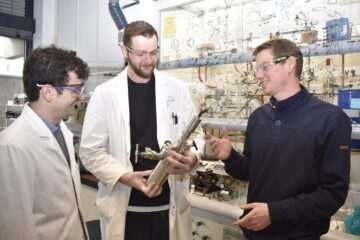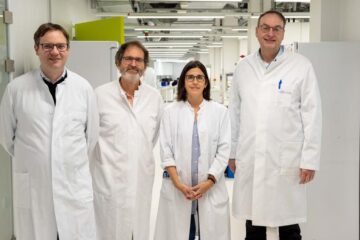Scientists identify new role for lung epithelial cells in sensing allergens in the air

Many foreign substances, called antigens, are inhaled daily, but the lungs have mechanisms that usually prevent people from making unwanted immune responses to these materials.
Sometimes, however, immune responses are generated to these substances, resulting in allergic responses and asthma. Scientists have been working to understand what triggers these undesirable airway responses.
In this new study, conducted in mice, scientists discovered that special sensors called Toll-like receptors (TLRs), which dot the surface of epithelial cells that line the lungs, detect the presence of antigens and produce signals that activate immune cells. The researchers observed that a particular TLR, TLR4, promoted allergic airway responses to antigen mixtures containing bacterial material or a very common allergen from house dust mites.
Previously, it was unclear whether TLRs on non-immune epithelial cells at mucosal surfaces such as those in the lungs were involved in antigen sensing, or if it was TLRs found on immune cells in these areas that were critical to these allergic responses. The research team observed that TLR4 on airway epithelial cells, not on immune cells, helped induce the initial immune response to antigens in the lungs. Eliminating TLR4 or blocking TLR4 function on the airway epithelial cells reduced the recruitment of immune cells to the lungs and the development of allergic disease.
This study demonstrates that TLR4 found on non-immune cells in the lungs contributes to the immune response to airborne antigens. The new results suggest that targeting TLRs may be a research avenue for developing novel treatments for allergic diseases such as asthma.
Media Contact
More Information:
http://www.niaid.nih.govAll latest news from the category: Health and Medicine
This subject area encompasses research and studies in the field of human medicine.
Among the wide-ranging list of topics covered here are anesthesiology, anatomy, surgery, human genetics, hygiene and environmental medicine, internal medicine, neurology, pharmacology, physiology, urology and dental medicine.
Newest articles

Efficient, sustainable and cost-effective hybrid energy storage system for modern power grids
EU project HyFlow: Over three years of research, the consortium of the EU project HyFlow has successfully developed a highly efficient, sustainable, and cost-effective hybrid energy storage system (HESS) that…

Safer alternative for an explosive reaction
The chemical industry has been using a reaction with explosive chemicals for over 100 years – now Mülheim scientists have discovered a safer alternative. The Ritter Group of the Max…

How immune cells communicate to fight viruses
Chemokines are signalling proteins that orchestrate the interaction of immune cells against pathogens and tumours. To understand this complex network, various techniques have been developed to identify chemokine-producing cells. However,…





















